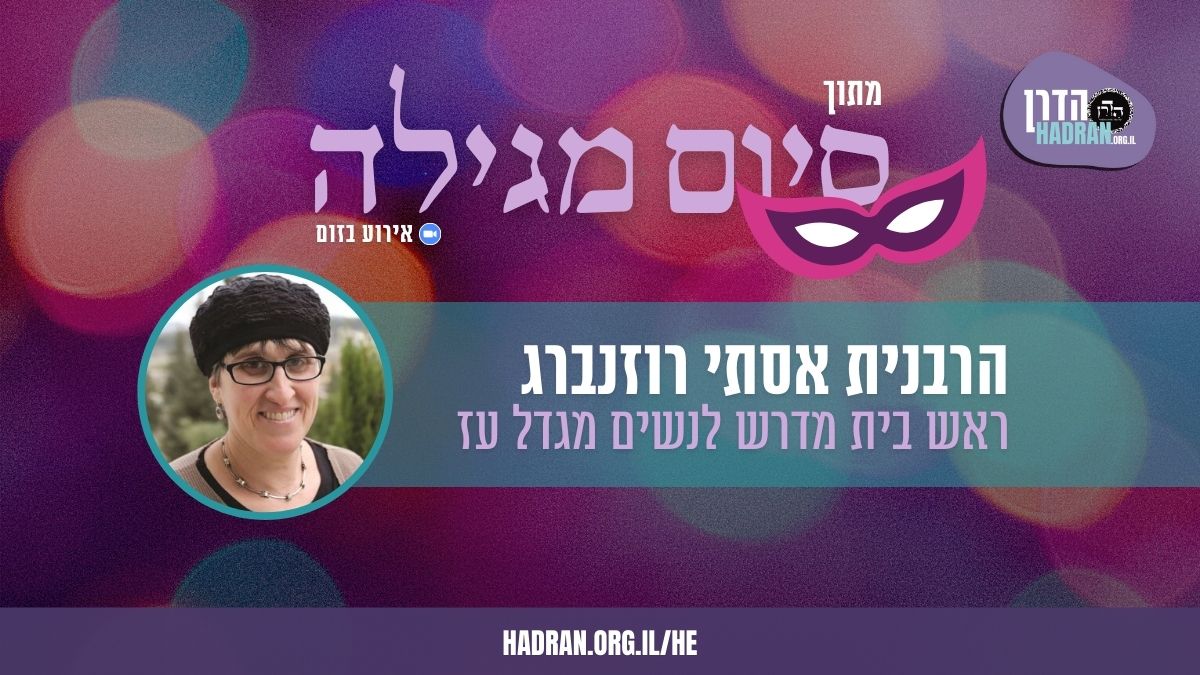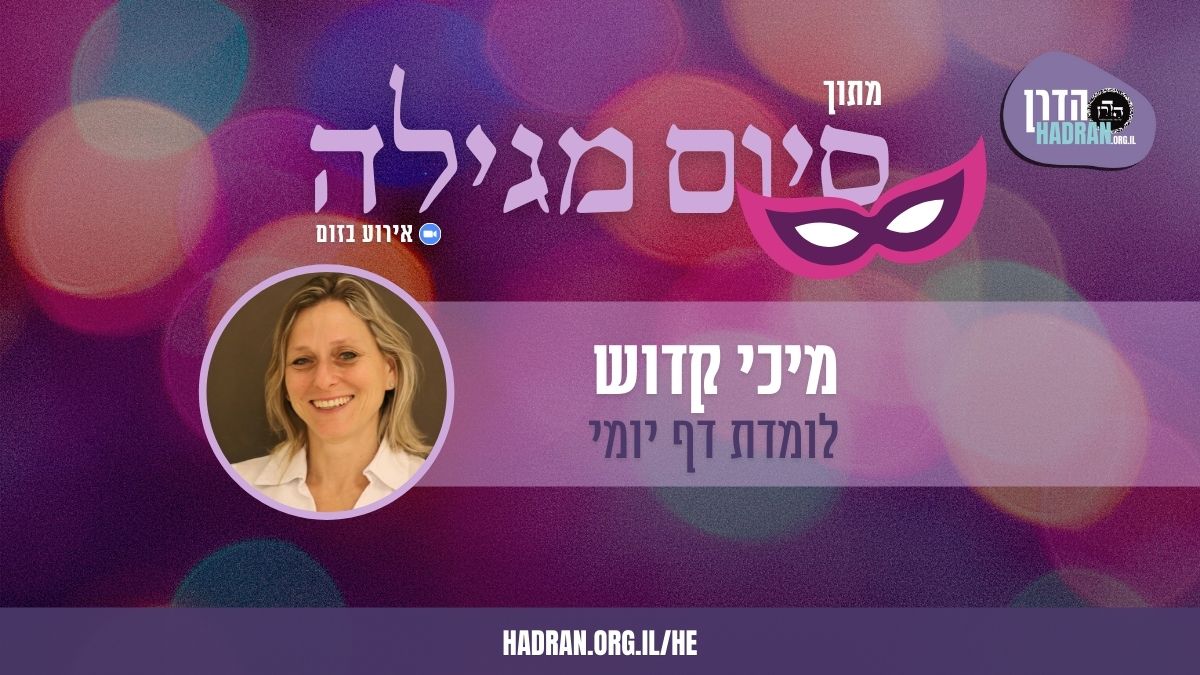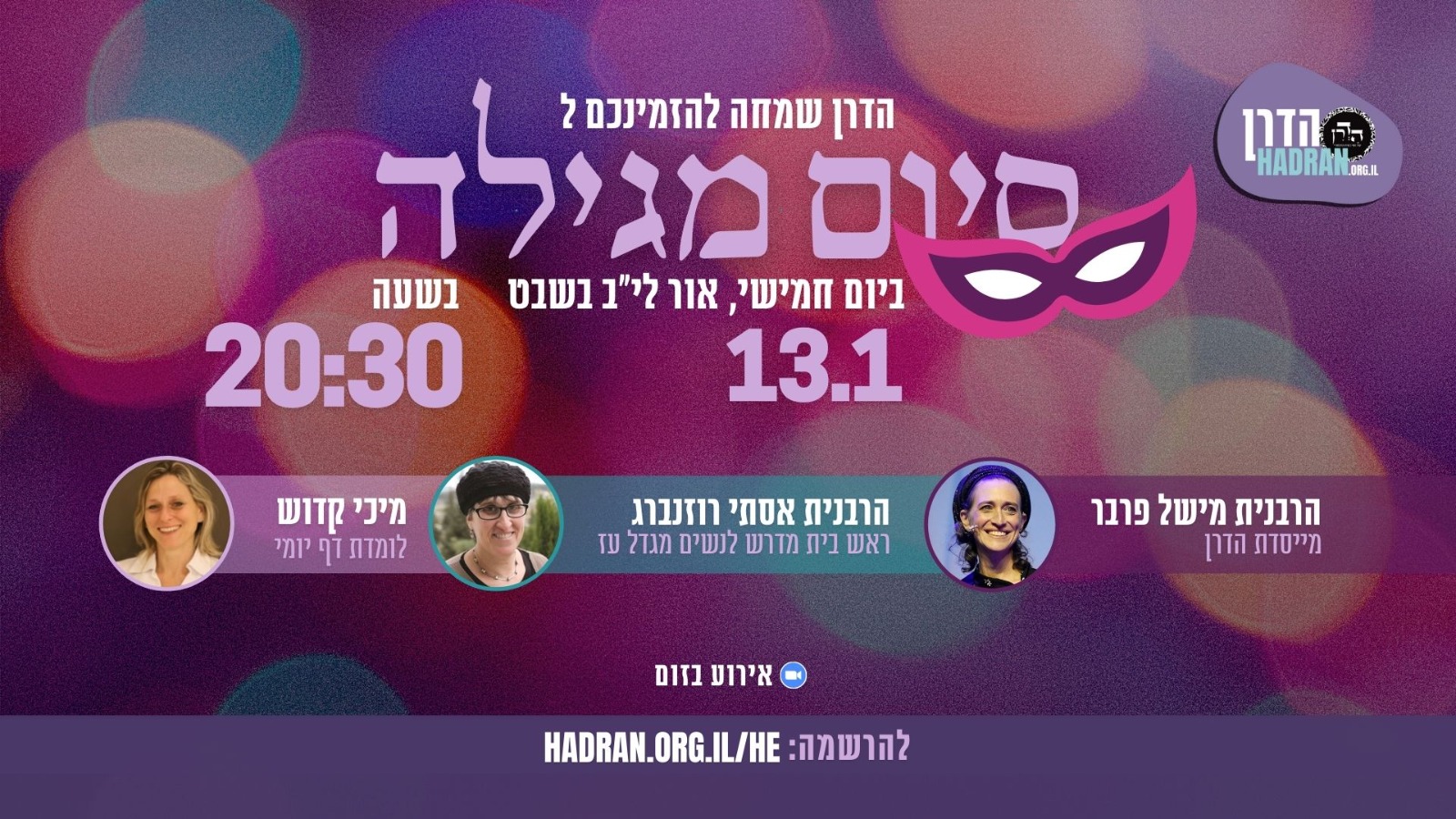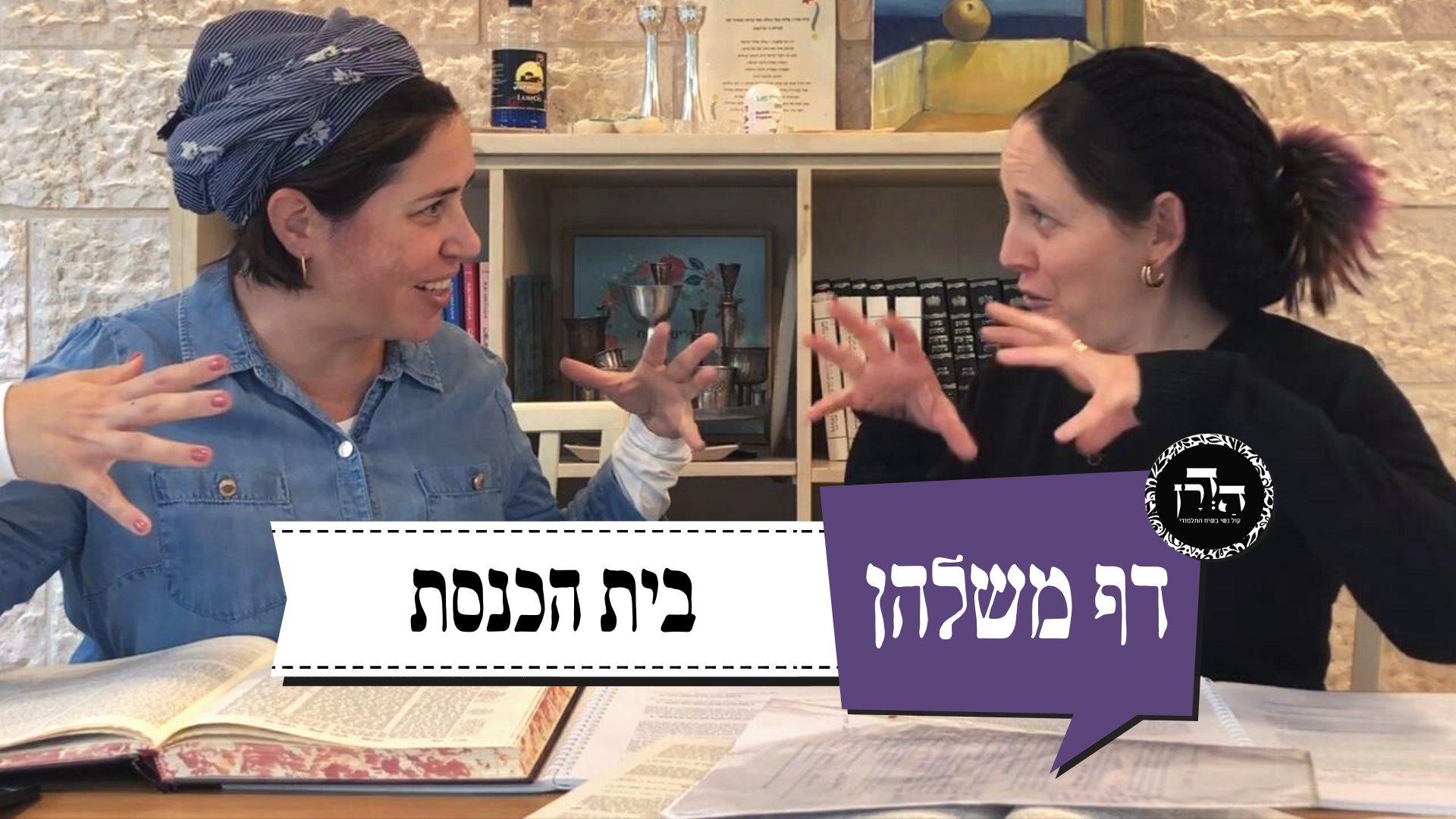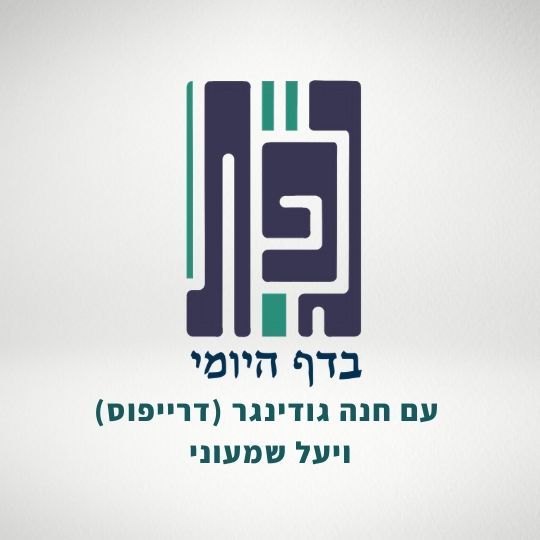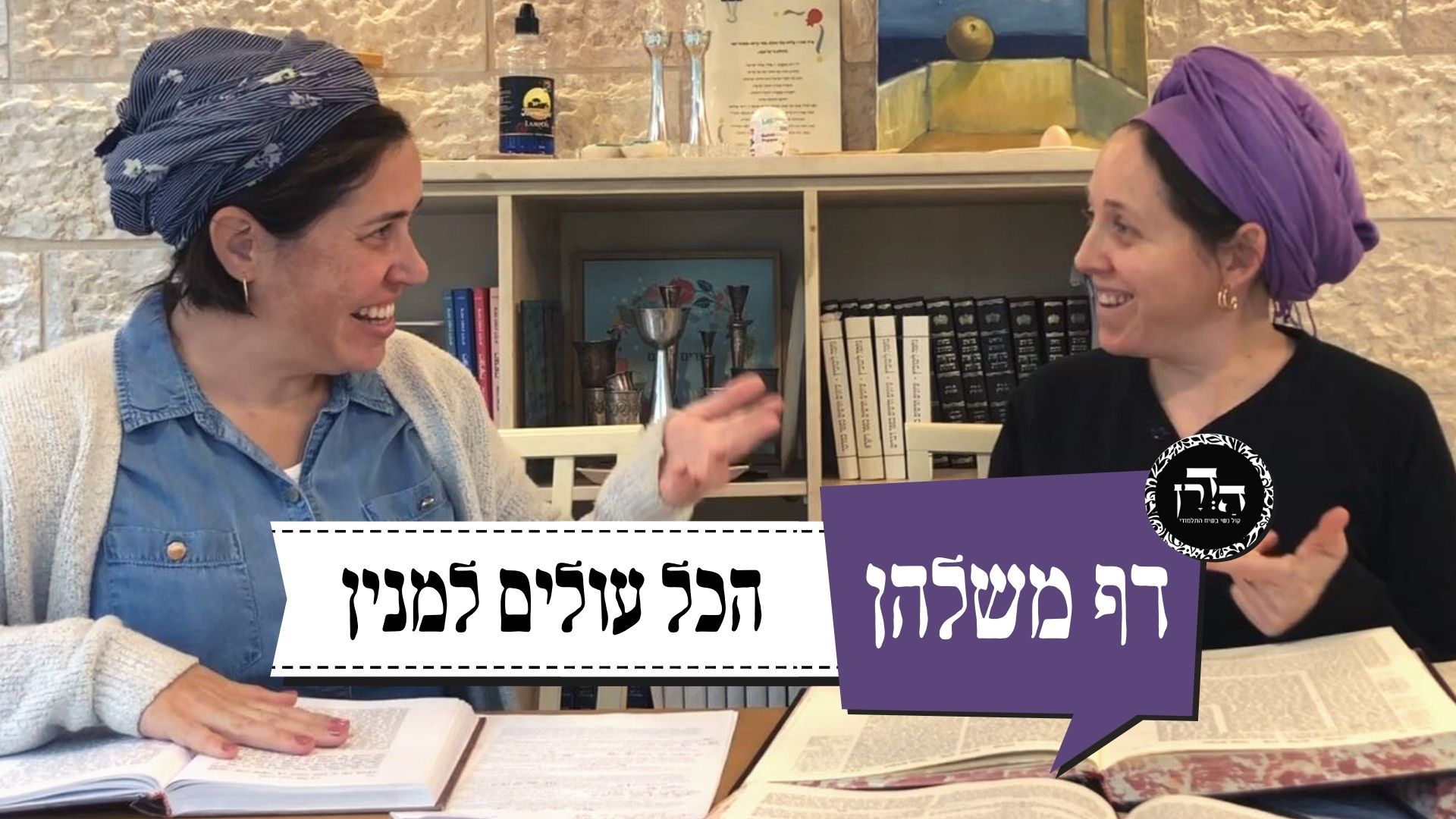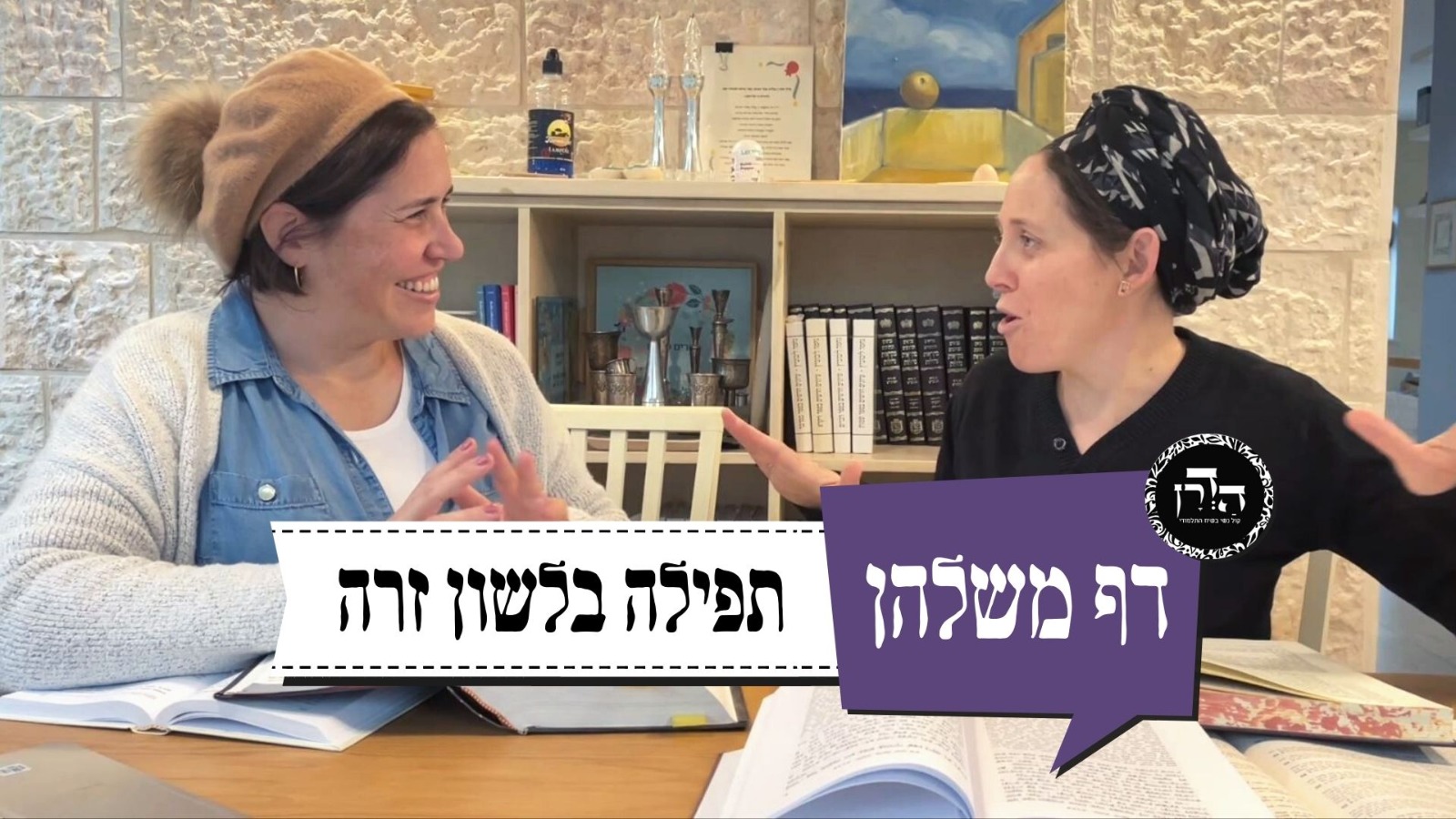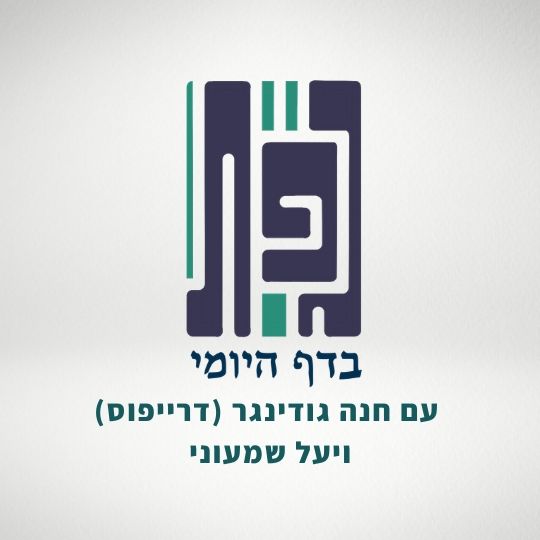ההבדל היחיד בין מי שמודר הנאה מחבירו לבין מי שנודר ממנו מאכל זה דריסת רגל בתוך השטח שלו ושאילת כלים שאין ראויים להכין בהם אכול. האם דריסת רגל נחשב להנאה – למה? ההבדל בין נדרים לנדבות זה בעניין אחריות – אם מפרישים בהמה והבהמה מתה או נאבדה – האם צריכים להביא בהמה אחרת או לא. נדר זה האומר "הרי עלי” ונדבה זה מי שאומר "הרי זו.” ההבדלים בין זב שרואה שתי ראויות לזב שרואה שלוש ראיות זה בעניין הבאת קרבן, אבל לשאר דברים – משכב, מושב, ספירת שבעה נקיים – שניהם שווים. מניין דורשים מהפסוקים את כל הדברים האלו? ההבדלים היחידים בין מצורע מוסגר (שמוסגר לשבעה ימים אך בסוף נקבע שלא היה בו נגע צרעת) לבין מצורע מוחלט (שהוקבע שיש לו צרעת) זה שהמוסגר לא פורע שערו ולא פורם בגדיו. לגבי תהליך הטהרה, רק המוחלט עושה תגלחת וצפרים. ההבדל בין ספרי קודש לבין תפילין ומזוזות זה שתפילין ומזוזות רק נכתבים בכתב אשורית וספרי קודש בכל לשון. רשב”ג אומר שספרי קודש מורתים רק ביוונית.
הלימוד השבוע מוקדש לזכות ולשלום הַיְימׇנוֹט אֱמוּנָה בַּת באנצ’י (קָסָאוּ) בת 11 שנעלמה במקום מגוריה בצפת, לפני שנתיים, ביום ט”ז אדר תשפ”ד (25.2.24), ולא נודעו עקבותיה.
רוצה להקדיש שיעור?

כלים
הלימוד השבוע מוקדש לזכות ולשלום הַיְימׇנוֹט אֱמוּנָה בַּת באנצ’י (קָסָאוּ) בת 11 שנעלמה במקום מגוריה בצפת, לפני שנתיים, ביום ט”ז אדר תשפ”ד (25.2.24), ולא נודעו עקבותיה.
כלים
העמקה
רוצה להבין מה באמת קורה מתחת לפני השטח של הסוגיה?
שיעורים, פודקאסטים והרחבות של מיטב המורות שלנו יפתחו לך עוד זוויות וכיווני חשיבה.
חדשה בלימוד הגמרא?
זה הדף הראשון שלך? איזו התרגשות עצומה! יש לנו בדיוק את התכנים והכלים שיעזרו לך לעשות את הצעדים הראשונים ללמידה בקצב וברמה שלך, כך תוכלי להרגיש בנוח גם בתוך הסוגיות המורכבות ומאתגרות.
פסיפס הלומדות שלנו
גלי את קהילת הלומדות שלנו, מגוון נשים, רקעים וסיפורים. כולן חלק מתנועה ומסע מרגש ועוצמתי.
מגילה ח
מַתְנִי׳ אֵין בֵּין הַמּוּדָּר הֲנָאָה מֵחֲבֵירוֹ לַמּוּדָּר מִמֶּנּוּ מַאֲכָל, אֶלָּא דְּרִיסַת הָרֶגֶל וְכֵלִים שֶׁאֵין עוֹשִׂין בָּהֶן אוֹכֶל נֶפֶשׁ.
MISHNA: The difference between one for whom benefit from another is forbidden by vow and one for whom benefit from another’s food is forbidden by vow is only with regard to stepping foot on his property, and with regard to borrowing utensils from him that one does not use in the preparation of food, but for other purposes; as those two benefits are prohibited to the former, but permitted to the latter.
גְּמָ׳ הָא לְעִנְיַן כֵּלִים שֶׁעוֹשִׂין בָּהֶן אוֹכֶל נֶפֶשׁ — זֶה וָזֶה שָׁוִין.
GEMARA: The Gemara infers that with regard to the matter of utensils that one uses in preparation of food, both this, one who vowed that any benefit is forbidden, and that, one who vowed that benefit from food is forbidden, are equal. It is prohibited for both to derive benefit from utensils used in the preparation of food.
דְּרִיסַת הָרֶגֶל? הָא לָא קָפְדִי אִינָשֵׁי! אֲמַר רָבָא: הָא מַנִּי — רַבִּי אֱלִיעֶזֶר, דְּאָמַר: וִיתּוּר אָסוּר בְּמוּדַּר הֲנָאָה.
The mishna stated that for one for whom benefit from another is forbidden by vow, stepping foot on the latter’s property is prohibited. The Gemara asks: What benefit is that? Aren’t people not particular about other people treading on their property? Rava said: In accordance with whose opinion is this mishna taught? It is the opinion of Rabbi Eliezer, who said: Overlooking is prohibited in the case of one for whom benefit is forbidden by vow. For one for whom benefit from another is forbidden by vow, benefit is forbidden even in matters with regard to which one is typically not particular and overlooks others’ use of his property, e.g., stepping foot on it.
מַתְנִי׳ אֵין בֵּין נְדָרִים לִנְדָבוֹת, אֶלָּא שֶׁהַנְּדָרִים חַיָּיב בְּאַחְרָיוּתָן, וּנְדָבוֹת אֵינוֹ חַיָּיב בְּאַחְרָיוּתָן.
MISHNA: The difference between animals consecrated to the Temple as vow offerings and animals consecrated as gift offerings is only that in the case of vow offerings, if they died or were lost before being sacrificed on the altar, one is obligated in the responsibility to replace them, and in the case of gift offerings, if they died or were lost, one is not obligated in the responsibility to replace them.
גְּמָ׳ הָא לְעִנְיַן ״בַּל תְּאַחֵר״ — זֶה וָזֶה שָׁוִין.
GEMARA: The Gemara infers that with regard to the matter of the prohibition: Do not be slack to pay one’s pledges, both this, a vow offering, and that, a gift offering, are equal. If one delayed bringing either a vow offering or a gift offering, he violates the prohibition.
תְּנַן הָתָם: אֵי זֶהוּ נֶדֶר? הָאוֹמֵר: ״הֲרֵי עָלַי עוֹלָה״. אֵיזוֹ הִיא נְדָבָה? הָאוֹמֵר: ״הֲרֵי זוֹ עוֹלָה״, וּמָה בֵּין נְדָרִים לִנְדָבוֹת? נְדָרִים, מֵתוּ אוֹ נִגְנְבוּ אוֹ אָבְדוּ — חַיָּיב בְּאַחְרָיוּתָן, נְדָבוֹת, מֵתוּ אוֹ נִגְנְבוּ אוֹ אָבְדוּ — אֵינוֹ חַיָּיב בְּאַחְרָיוּתָן.
We learned in a mishna there: Which is the case of a vow offering? It is one who says: It is incumbent upon me to bring a burnt-offering. Which is the case of a gift offering? It is one who says: This animal is a burnt-offering. And what is the difference between a vow offering and a gift offering? With regard to vow offerings, if the animals died or were stolen or were lost, the one who vowed is obligated in the responsibility to replace them, as he undertook to bring a burnt-offering and he is not absolved of his obligation until he brings the offering. With regard to gift offerings, however, if the animals died or were stolen or were lost, the one who vowed is not obligated in the responsibility to replace them.
מְנָהָנֵי מִילֵּי? דְּתָנוּ רַבָּנַן: ״וְנִרְצָה לוֹ לְכַפֵּר עָלָיו״, רַבִּי שִׁמְעוֹן אוֹמֵר: אֶת שֶׁעָלָיו — חַיָּיב בְּאַחְרָיוּתוֹ, וְאֶת שֶׁאֵינוֹ עָלָיו — אֵינוֹ חַיָּיב בְּאַחְרָיוּתוֹ.
The Gemara asks: From where are these matters derived? The Gemara answers: It is as the Sages taught in a baraita with regard to a burnt-offering, that the verse states: “And it shall be accepted for him to make atonement upon him” (Leviticus 1:4). Rabbi Shimon says: That which is incumbent upon him, i.e., which he accepted as a personal obligation, he bears responsibility to replace it if it died or was stolen; however, that which is not incumbent upon him, i.e., that which he did not accept as a personal obligation but which he designated as an offering, he does not bear responsibility to replace it.
מַאי מַשְׁמַע? אָמַר רַבִּי יִצְחָק בַּר אַבְדִּימִי: כֵּיוָן דְּאָמַר ״עָלַי״ — כְּמַאן דִּטְעִין אַכַּתְפֵּיהּ דָּמֵי.
The Gemara asks: From where may that conclusion be inferred from the verse? Rabbi Yitzḥak bar Avdimi said: Since he said it is incumbent upon me to bring a burnt-offering, he is considered as one who bears it upon his shoulders. The expression: Upon me, indicates an assumption of responsibility to bring an offering.
מַתְנִי׳ אֵין בֵּין זָב הָרוֹאֶה שְׁתֵּי רְאִיּוֹת לָרוֹאֶה שָׁלֹשׁ אֶלָּא קׇרְבָּן.
MISHNA: The difference between a zav who experiences two emissions of a pus-like discharge from his penis and one who experiences three emissions is only that the zav who experienced three emissions is obligated to bring an offering after he recovers, in order to complete his purification process.
גְּמָ׳ הָא לְעִנְיַן מִשְׁכָּב וּמוֹשָׁב וּסְפִירַת שִׁבְעָה — זֶה וָזֶה שָׁוִין.
GEMARA: The Gemara infers that with regard to the matter of transmitting ritual impurity to a surface designated for lying and a surface designated for sitting, and similarly with regard to the counting of seven days clean of emissions so that he may immerse in a ritual bath as part of the purification process, both this, i.e., one who experienced two emissions, and that, one who experienced three emissions, are equal.
מְנָהָנֵי מִילֵּי? דְּתָנוּ רַבָּנַן: רַבִּי סִימַאי אוֹמֵר: מָנָה הַכָּתוּב שְׁתַּיִם, וּקְרָאוֹ ״טָמֵא״. שָׁלֹשׁ, וּקְרָאוֹ ״טָמֵא״. הָא כֵּיצַד? שְׁתַּיִם לַטּוּמְאָה וְשָׁלֹשׁ לַקׇּרְבָּן.
The Gemara asks: From where are these matters derived? The Gemara answers: It is as the Sages taught in a baraita that Rabbi Simai says: The verse enumerated two emissions: “When any man has an emission out of his flesh, due to his emission he is impure” (Leviticus 15:2), and it called the zav impure. Another verse enumerated three emissions: “And this shall be his impurity in his emission: Whether his flesh runs with his emission, or his flesh be stopped from his emission, it is his impurity” (Leviticus 15:3), and it too called him impure. How so? If he is impure after two emissions, for what purpose does the Torah mention three? It is to teach: Two emissions to establish impurity and three to render him liable to bring an offering.
וְאֵימַר: שְׁתַּיִם לְטוּמְאָה וְלֹא לְקׇרְבָּן, שָׁלֹשׁ לְקׇרְבָּן וְלֹא לְטוּמְאָה! אָמְרַתְּ: עַד שֶׁלֹּא רָאָה שָׁלֹשׁ רָאָה שְׁתַּיִם.
The Gemara raises an alternative. And say instead: Two emissions to establish impurity but not to render him liable to bring an offering; three emissions to render him liable to bring an offering, but not to establish impurity. The Gemara rejects this: That is impossible, as you can say that until he experienced three emissions, he already experienced two, and therefore he is impure in the case of three emissions as well.
וְאֵימַר: שְׁתַּיִם לְקׇרְבָּן וְלֹא לְטוּמְאָה, שָׁלֹשׁ אַף לְטוּמְאָה! לָא סָלְקָא דַּעְתָּךְ, דְּתַנְיָא: ״וְכִפֶּר עָלָיו הַכֹּהֵן לִפְנֵי ה׳ מִזּוֹבוֹ״, מִקְצָת זָבִין מְבִיאִין קׇרְבָּן וּמִקְצָת זָבִין אֵין מְבִיאִין קׇרְבָּן. הָא כֵּיצַד? רָאָה שָׁלֹשׁ — מֵבִיא, שְׁתַּיִם — אֵינוֹ מֵבִיא.
The Gemara raises a different alternative. And say instead: Two emissions to render him liable to bring an offering, but not to establish impurity; three emissions to establish impurity as well. The Gemara answers that this suggestion cannot enter your mind, as it is taught in a baraita that the verse states: “And the priest shall make atonement for him before the Lord from his emission” (Leviticus 15:15). The preposition “from” that precedes the words “his emissions” indicates that some with the status of a zav bring an offering and some with the status of a zav do not bring an offering. How so? If he experienced three emissions, he brings an offering; if he experienced two emissions, he does not bring an offering.
אוֹ אֵינוֹ אֶלָּא: רָאָה שְׁתַּיִם — מֵבִיא, רָאָה שָׁלֹשׁ — אֵינוֹ מֵבִיא, אָמְרַתְּ: עַד שֶׁלֹּא רָאָה שָׁלֹשׁ רָאָה שְׁתַּיִם.
The baraita suggests: Or perhaps, it means nothing other than that if one experienced two emissions, he brings an offering; if he experienced three emissions, he does not bring an offering. The baraita rejects this: That is impossible, as you can say that until he experienced three emissions, he already experienced two, and therefore he is obligated to bring an offering in the case of three emissions as well.
וְאִיצְטְרִיךְ דְּרַבִּי סִימַאי וְאִיצְטְרִיךְ ״מִזּוֹבוֹ״, דְּאִי מִדְּרַבִּי סִימַאי — הֲוָה אָמֵינָא כִּי קוּשְׁיַין, קָמַשְׁמַע לַן ״מִזּוֹבוֹ״. וְאִי ״מִזּוֹבוֹ״ — לָא יָדַעְנָא כַּמָּה רְאִיּוֹת, קָמַשְׁמַע לַן דְּרַבִּי סִימַאי.
The Gemara comments: It was necessary to cite the proof of Rabbi Simai based on the number of mentions of the word emissions in the two verses, and it was necessary to cite the proof from the words: From his emission. As if the difference between two and three emissions was derived from the statement of Rabbi Simai, I would have said in accordance with our question: Perhaps one who experiences two emissions brings an offering, and one who experiences three emissions is impure and brings an offering. Therefore, it teaches us: From his emission. And if the difference between two and three emissions was derived from the term: From his emission, I would not have known how many emissions render him liable to bring an offering, only that some with the status of a zav are not required to bring an offering. Therefore, it teaches us the proof cited by Rabbi Simai.
וְהַשְׁתָּא דְּאָמְרַתְּ ״מִזּוֹבוֹ״ לִדְרָשָׁא, ״וְכִי יִטְהַר הַזָּב מִזּוֹבוֹ״ מַאי דָּרְשַׁתְּ בֵּיהּ?
The Gemara asks: And now that you said that the term: From his emission, is exclusionary and comes for derivation, what do you derive from the verse: “And when the zav is cleansed from his emission” (Leviticus 15:13)?
הַהוּא מִיבְּעֵי לֵיהּ לְכִדְתַנְיָא: ״וְכִי יִטְהַר הַזָּב״ — לִכְשֶׁיִּפְסוֹק מִזּוֹבוֹ, [״מִזּוֹבוֹ״ —] וְלֹא מִזּוֹבוֹ וְנִגְעוֹ. ״מִזּוֹבוֹ וְסָפַר״ — לִימֵּד עַל זָב בַּעַל שְׁתֵּי רְאִיּוֹת שֶׁטָּעוּן סְפִירַת שִׁבְעָה.
The Gemara answers: That verse is needed to derive that which was taught in a baraita. It is written: “And when the zav is cleansed from his emission, then he shall count to himself seven days for his purification” (Leviticus 15:13), when his emissions cease. The baraita infers from the term: From his emission, that he needs to be cleansed only from his emission, but not from his emission and his leprosy. If one was both a zav and also had leprosy, he need not wait until he is asymptomatic of his leprosy before counting seven clean days. Rather, he counts seven clean days, and after the leprosy symptoms cease, he immerses for both impurities. “From his emission, then he shall count”: This teaches concerning a zav who experienced two emissions, that he too requires a count of seven clean days.
וַהֲלֹא דִּין הוּא, אִם מְטַמֵּא מִשְׁכָּב וּמוֹשָׁב לֹא יְהֵא טָעוּן סְפִירַת שִׁבְעָה?
The baraita continues: But in order to derive that halakha, the verse is unnecessary, as isn’t it only logical? If a zav who experienced two emissions renders a surface designated for lying and a surface designated for sitting ritually impure and all strictures of a zav apply to him, wouldn’t he require a count of seven clean days to become purified?
שׁוֹמֶרֶת יוֹם כְּנֶגֶד יוֹם תּוֹכִיחַ, שֶׁמְּטַמְּאָה מִשְׁכָּב וּמוֹשָׁב, וְאֵינָהּ טְעוּנָה סְפִירַת שִׁבְעָה.
A woman who observes a clean day for one day or two days that she experiences a discharge will prove that this is not the case. This refers to a woman who experienced one or two days of bleeding not during her menstrual period and is required to wait one day without any further discharge of blood before immersion in a ritual bath. This is significant because she renders a surface designated for lying and a surface designated for sitting ritually impure, and nevertheless she does not require a count of seven clean days to become purified.
וְאַף אַתָּה אַל תִּתְמַהּ עַל זֶה, שֶׁאַף עַל פִּי שֶׁמְּטַמֵּא מִשְׁכָּב וּמוֹשָׁב לֹא יְהֵא טָעוּן סְפִירַת שִׁבְעָה, תַּלְמוּד לוֹמַר: ״מִזּוֹבוֹ וְסָפַר״, מִקְצָת זוֹבוֹ וְסָפַר — לִימֵּד עַל זָב בַּעַל שְׁתֵּי רְאִיּוֹת שֶׁטָּעוּן סְפִירַת שִׁבְעָה.
And you too should not then be surprised that this zav, although he renders a surface designated for lying and a surface designated for sitting ritually impure, he does not require a count of seven clean days to become purified. Therefore, the verse states: “From his emission, then he shall count,” meaning that even a partial zav is obligated in the mitzva of: Then he shall count. This teaches concerning a zav who experienced two emissions, that he too requires a count of seven clean days.
אֲמַר לֵיהּ רַב פָּפָּא לְאַבָּיֵי: מַאי שְׁנָא הַאי ״מִזּוֹבוֹ״ דִּמְרַבֵּי בֵּיהּ זָב בַּעַל שְׁתֵּי רְאִיּוֹת, וּמַאי שְׁנָא הַאי ״מִזּוֹבוֹ״ דִּמְמַעֵט בֵּיהּ זָב בַּעַל שְׁתֵּי רְאִיּוֹת?
Rav Pappa said to Abaye: What is different about this verse that states: “From his emission,” which is interpreted to include a zav who experienced two emissions in the obligation to count seven clean days; and what is different about that verse that states: “From his emission,” which is interpreted to exclude a zav who experienced two emissions from the obligation to bring an offering? Why is the identical term interpreted once as inclusionary and once as exclusionary?
אֲמַר לֵיהּ: אִי סָלְקָא דַעְתָּךְ הַאי לְמַעוֹטֵי הוּא דַּאֲתָא — לִישְׁתּוֹק קְרָא מִינֵּיהּ, וְכִי תֵּימָא: אָתְיָא מִדִּינָא, שׁוֹמֶרֶת יוֹם כְּנֶגֶד יוֹם תּוֹכִיחַ.
Abaye said to him: If it enters your mind to say that this instance of the term: “From his emission,” comes to exclude a zav who experienced two emissions from the obligation to count seven clean days, let the verse remain silent and omit the term, as there would have been no basis to include a zav who experienced two emissions in that halakha. And if you would say that this can be inferred logically, a woman who observes a day for a day will prove that there is no correlation between ritual impurity transmitted to a surface designated for lying and a surface designated for sitting, and the obligation to count seven clean days.
וְכִי תֵּימָא: הַאי מִיבְּעֵי לֵיהּ ״מִזּוֹבוֹ״ וְלֹא מִנִּגְעוֹ, אִם כֵּן לִיכְתּוֹב קְרָא ״וְכִי יִטְהַר הַזָּב״ וְלִישְׁתּוֹק. ״מִזּוֹבוֹ״ לְמָה לִי? לִימֵּד עַל זָב בַּעַל שְׁתֵּי רְאִיּוֹת שֶׁטָּעוּן סְפִירַת שִׁבְעָה.
And if you would say that this term: From his emission, is needed to derive a different inclusion, i.e., that he counts seven days when he is clean from his emission and not from his leprosy and therefore it was necessary to write this term, that is not so. As if it were so, then let the verse write: “And when the zav is cleansed” and let the verse remain silent and omit the term, and it would have been clear that even one afflicted with leprosy counts seven clean days once he is cleansed from his emission. Why then do I need the term: From his emission? Rather, it must be understood as an inclusionary term that teaches concerning a zav who experienced two emissions, that he too requires a count of seven clean days.
מַתְנִי׳ אֵין בֵּין מְצוֹרָע מוּסְגָּר לִמְצוֹרָע מוּחְלָט אֶלָּא פְּרִיעָה וּפְרִימָה.
MISHNA: The difference between a quarantined leper, i.e., one examined by a priest who found his symptoms to be inconclusive, and who must therefore remain in isolation for a period of up to two weeks waiting to see if conclusive symptoms develop; and a confirmed leper, i.e., one whose symptoms were conclusive and the priest declared him an absolute leper, is only with regard to letting the hair on one’s head grow wild and rending one’s garments. A confirmed leper is obligated to let the hair on his head grow wild and rend his garments; a quarantined leper is not.
אֵין בֵּין טָהוֹר מִתּוֹךְ הֶסְגֵּר לְטָהוֹר מִתּוֹךְ הֶחְלֵט אֶלָּא תִּגְלַחַת וְצִפֳּרִים.
The difference between a leper purified from quarantine, whose symptoms never became conclusive, and a leper purified from a state of confirmed leprosy is only with regard to shaving the hair on all his body and bringing birds as a purification offering, which are obligations incumbent only upon the confirmed leper.
גְּמָ׳ הָא לְעִנְיַן שִׁילּוּחַ [וְטוּמְאָה] — זֶה וָזֶה שָׁוִין.
GEMARA: The Gemara infers that with regard to the matter of expulsion, from all three camps in the encampment of the Israelites in the desert and from the walled cities in Eretz Yisrael, and the ritual impurity of a leper: Both this, the quarantined leper, and that, the confirmed leper, are equal.
מְנָהָנֵי מִילֵּי? דְּתָנֵי רַב שְׁמוּאֵל בַּר יִצְחָק קַמֵּיהּ דְּרַב הוּנָא: ״וְטִהֲרוֹ הַכֹּהֵן מִסְפַּחַת הִיא וְכִבֶּס בְּגָדָיו וְטָהֵר״, טָהוֹר מִפְּרִיעָה וּפְרִימָה דְּמֵעִיקָּרָא.
The Gemara asks: From where are these matters derived? The Gemara answers: It is as Rav Shmuel bar Yitzḥak taught in a baraita before Rav Huna. It is written with regard to a leper who was purified from quarantine: “The priest shall pronounce him clean: It is but a scab, and he shall wash his clothes and be purified [vetaher]” (Leviticus 13:6). The word vetaher is not in the future tense, which would indicate that from that point he is purified; it is rather in the present tense, indicating that at the outset, even before the priest’s pronouncement, he was pure in the sense that he was exempt from the initial obligation of letting the hair on his head grow wild and rending his garments, as those obligations are incumbent exclusively upon the confirmed leper.
אֲמַר לֵיהּ רָבָא: אֶלָּא מֵעַתָּה, גַּבֵּי זָב דִּכְתִיב ״וְכִבֶּס בְּגָדָיו וְטָהֵר״, הָתָם מַאי ״וְטָהֵר״ מֵעִיקָּרָא אִיכָּא?
Rava said to him: However, if that is so, i.e., that vetaher means that one is somewhat pure at the outset, then with regard to a zav, as it is written: “And he shall wash his clothes, and bathe his flesh in running water, and he shall be clean [vetaher]” (Leviticus 15:13), there, what sense of: And he shall be clean, at the outset is there in that case? Up until that point, the zav was ritually impure in every sense.
אֶלָּא: טָהוֹר הַשְׁתָּא מִלְּטַמֵּא כְּלִי חֶרֶס בְּהֶיסֵּט, אַף עַל גַּב דַּהֲדַר חָזֵי — לָא מְטַמֵּא לְמַפְרֵעַ.
Rather, vetaher means that he is now pure from rendering earthenware vessels impure through movement. There is a halakha that a zav renders a vessel impure if he causes it to be moved, even though he did not come into direct contact with it, even if the opening of the vessel is smaller than a fingerbreadth. The verse teaches that once the zav is purified through counting and immersion, he no longer renders vessels impure in that manner. The novelty here is that even if he then experiences another emission, he does not render the vessels impure retroactively. This emission is unrelated to the previous emissions. Therefore, upon experiencing the emission, the zav is not retroactively considered to have been ritually impure the entire time, even after immersion. Rather, since he counted seven clean days and immersed, the legal status of this latest emission is that of a new emission.
הָכָא נָמֵי טָהוֹר [הַשְׁתָּא מִלְּטַמֵּא בְּבִיאָה לְמַפְרֵעַ].
Here too, with regard to the leper, vetaher means that the quarantined leper is now pure from retroactively rendering the contents of a house impure by his entrance into the house. If someone with inconclusive symptoms of leprosy was quarantined and then declared ritually pure, and subsequently conclusive symptoms of leprosy developed, he is not considered to have been a leper from the time of the original quarantine, in which case the contents of any house he entered from that point would be rendered impure retroactively. Rather, once he was purified, he was absolutely pure. These subsequent conclusive symptoms are unrelated to the previous inconclusive symptoms. Therefore, the proof adduced by Rav Shmuel bar Yitzḥak is no proof.
אֶלָּא אָמַר רָבָא, מֵהָכָא: ״וְהַצָּרוּעַ אֲשֶׁר בּוֹ הַנֶּגַע״, מִי שֶׁצָּרַעְתּוֹ תְּלוּיָה בְּגוּפוֹ — יָצָא זֶה שֶׁאֵין צָרַעְתּוֹ תְּלוּיָה בְּגוּפוֹ אֶלָּא בְּיָמִים.
Rather, Rava said that the halakha that a quarantined leper is exempt from the obligation to let his hair grow and to rend his clothing is derived from here. It is written: “And the leper in whom [bo] the plague is, his clothes shall be rent, and the hair of his head shall grow wild” (Leviticus 13:45), indicating that only one whose leprosy is dependent on the state of his body, in whom the plague is, is obligated to let his hair grow wild and to rend his garments. This excludes that leper whose leprosy is not dependent solely on the state of his body, but rather on the passage of days, as he is obligated to wait seven days.
אֲמַר לֵיהּ אַבָּיֵי: אֶלָּא מֵעַתָּה ״כָּל יְמֵי אֲשֶׁר הַנֶּגַע בּוֹ יִטְמָא״, מִי שֶׁצָּרַעְתּוֹ תְּלוּיָה בְּגוּפוֹ — הוּא דְּטָעוּן שִׁילּוּחַ, וְשֶׁאֵין צָרַעְתּוֹ תְּלוּיָה בְּגוּפוֹ — אֵין טָעוּן שִׁילּוּחַ,
Abaye said to him: However, if that is so, then also with regard to the verse: “All the days during which the plague shall be in him [bo] he shall be impure” (Leviticus 13:46), say one whose leprosy is dependent on the state of his body requires expulsion from the camp, and one whose leprosy is not dependent solely on the state of his body, but rather on the passage of days, does not require expulsion.
וְכִי תֵּימָא: הָכִי נָמֵי, וְהָא קָתָנֵי: אֵין בֵּין מְצוֹרָע מוּסְגָּר לִמְצוֹרָע מוּחְלָט אֶלָּא פְּרִיעָה וּפְרִימָה, הָא לְעִנְיַן שִׁילּוּחַ וּלְטַמּוֹיֵי בְּבִיאָה — זֶה וָזֶה שָׁוִין!
And if you would say: Indeed that is so, but isn’t it taught in the mishna: The difference between a quarantined leper and a confirmed leper is only with regard to letting the hair on one’s head grow wild and rending one’s garments? And it is inferred that with regard to the matter of expulsion and the capacity of a leper to render impure the contents of a house by entry into the house, both this, the quarantined leper, and that, the confirmed leper, are equal.
אֲמַר לֵיהּ: ״יְמֵי״ ״כׇּל יְמֵי״ — לְרַבּוֹת מְצוֹרָע מוּסְגָּר לְשִׁילּוּחַ.
Rava said to him: There is a different source for the obligation to expel the quarantined leper from the camp. The verse could have stated: The days during which the plague shall be upon him. Instead the verse states: All the days, to include a quarantined leper in the obligation of expulsion from the camp, like a confirmed leper.
אִי הָכִי, תִּגְלַחַת וְצִפֳּרִים מַאי טַעְמָא לָא? דְּקָתָנֵי: אֵין בֵּין טָהוֹר מִתּוֹךְ הֶסְגֵּר לַטָּהוֹר מִתּוֹךְ הֶחְלֵט — אֶלָּא תִּגְלַחַת וְצִפֳּרִים!
The Gemara asks: If that is so, what is the reason that a quarantined leper is not obligated in shaving the hair on all his body and bringing birds as a purification offering as part of his purification process? As it teaches in the mishna: The difference between a leper purified from quarantine, whose symptoms never became conclusive, and a leper purified from a state of confirmed leprosy, is only with regard to shaving the hair on all his body and bringing birds as a purification offering.
אָמַר אַבָּיֵי: אָמַר קְרָא: ״וְיָצָא הַכֹּהֵן אֶל מִחוּץ לַמַּחֲנֶה וְהִנֵּה נִרְפָּא נֶגַע הַצָּרַעַת״, מִי שֶׁצָּרַעְתּוֹ תְּלוּיָה בִּרְפוּאוֹת. יָצָא זֶה שֶׁאֵין צָרַעְתּוֹ תְּלוּיָה בִּרְפוּאוֹת אֶלָּא בְּיָמִים.
Abaye said that the verse states: “And the priest shall go out of the camp, and the priest shall look, and behold, if the plague of leprosy is healed in the leper” (Leviticus 14:3), then the purification process that includes shaving and bringing birds commences. This indicates that these halakhot apply to a confirmed leper whose leprosy is dependent on healing, to exclude that leper whose leprosy is not dependent solely on healing but rather on the passage of days. Even if his symptoms are healed, he is pure only at the conclusion of the seven days of quarantine.
מַתְנִי׳ אֵין בֵּין סְפָרִים לִתְפִלִּין וּמְזוּזוֹת, אֶלָּא שֶׁהַסְּפָרִים נִכְתָּבִין בְּכׇל לָשׁוֹן, וּתְפִלִּין וּמְזוּזוֹת אֵינָן נִכְתָּבוֹת אֶלָּא אַשּׁוּרִית.
MISHNA: The difference between Torah scrolls, and phylacteries and mezuzot, in terms of the manner in which they are written, is only that Torah scrolls are written in any language, whereas phylacteries and mezuzot are written only in Ashurit, i.e., in Hebrew and using the Hebrew script.
רַבָּן שִׁמְעוֹן בֶּן גַּמְלִיאֵל אוֹמֵר: אַף בִּסְפָרִים לֹא הִתִּירוּ שֶׁיִּכָּתְבוּ אֶלָּא יְווֹנִית.
Rabban Shimon ben Gamliel says: Even with regard to Torah scrolls, the Sages permitted them to be written only in Greek. Torah scrolls written in any other language do not have the sanctity of a Torah scroll.
גְּמָ׳ הָא לְתוֹפְרָן בְּגִידִין וּלְטַמֵּא אֶת הַיָּדַיִם — זֶה וָזֶה שָׁוִין.
GEMARA: The Gemara infers that with regard to the matter of stitching the sheets of parchment with sinews, and with regard to rendering the hands of one who touches them impure, both this, Torah scrolls, and that, phylacteries and mezuzot, are equal. The Sages issued a decree rendering the hands of one who touches sacred scrolls impure with second-degree ritual impurity.
וּסְפָרִים נִכְתָּבִין בְּכׇל לָשׁוֹן וְכוּ׳. וּרְמִינְהוּ: מִקְרָא שֶׁכְּתָבוֹ תַּרְגּוּם, וְתַרְגּוּם שֶׁכְּתָבוֹ מִקְרָא, וּכְתָב עִבְרִי — אֵינוֹ מְטַמֵּא אֶת הַיָּדַיִם עַד שֶׁיִּכְתְּבֶנּוּ בִּכְתָב אַשּׁוּרִית, עַל הַסֵּפֶר, וּבִדְיוֹ.
The mishna stated: Torah scrolls are written in any language. And the Gemara raises a contradiction from a baraita: A Torah scroll containing a Hebrew verse in the Bible that one wrote in Aramaic translation, or a verse written in Aramaic translation that one wrote in the Hebrew of the Bible, or that was written in the ancient Hebrew script and not in Ashurit, renders the hands impure only if one writes it in Ashurit script, on a parchment scroll, and in ink. Apparently, contrary to the mishna, a scroll written in a language other than Hebrew is not sacred.
אָמַר רָבָא: לָא קַשְׁיָא
Rava said: This is not difficult.







